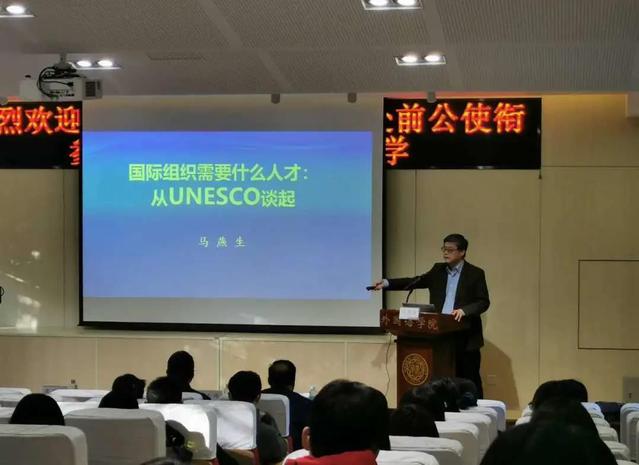
On November 3rd, the second activity of the The 2020 Training Camp for Internships in International Organizations organized by the International Cooperation and Exchange Office and the Student Employment Guidance Center of Nankai University and undertaken by the College of Foreign Languages was successfully held at 111 Academic Lecture Hall of the Seventh Building on Balitai Campus. It is an honored for the organizers to have invited Ma Yansheng, the former Minister-Counselor of the Ministry of Education in China Embassy in France, to visit Nankai University and give a special lecture entitled What Kind of Talents are Needed by International Organizations: Starting from UNESCO. Guan Naijia, former Vice President of Nankai University, Professor of the School of Materials Science and Engineering, Cheng Zhihui, Deputy Director of the International Cooperation and Exchange Office, Li Jun, Deputy Minister of the Party Committee of the Student Affairs Department and Director of the Student Employment Center, Mu Xiangwang, Party Secretary of the School of Foreign Languages, Jiao Yanting, Vice Dean of the College of Foreign Languages, Wang Kai, Vice Dean of the College of Foreign Languages, and Xiang Yu, Deputy Secretary of the Party Committee and Vice President of the College of Foreign Languages attended the meeting. Professor Yan Guodong, Dean of the College of Foreign Languages hosted the lecture.
In the lecture, Ma Yansheng first introduced the classification and main activities of international organizations and international staff. Then, he introduced the classification and characteristics of international organizations with examples from geographical distribution and member’s composition, and uses the United Nations as an example to explain the general structure and operation of international organizations. When talking about the high-level leadership and professional staff within international organizations, Ma Yansheng mentioned that in addition to related professional fields, a large number of professionals in management, translation, journalism, and law are also required. Generally, the higher the rank is, the higher the requirements for selection and appointment will be.
Subsequently, Ma Yansheng talked about the problems and difficulties our country faces in the process of joining in international organizations based on his own personal experiences. He pointed out that with the rapid development of economy, our country needs to participate in international affairs and social practice more extensively and deeply, not only through bilateral channels between countries, but also through multilateral international organizations. At the same time, we should attach importance to the role of international non-governmental organizations. But now, there are still many problems; for instance, our country lacks international talents, and it is difficult for many people to achieve the compatibility between high level of foreign language and outstanding professional background. Besides, there are few employees from our country working in the UN agencies and specialized agencies, and the staff are relatively lower-ranked. Compared with the international staff in developed countries, there are disparities in the professional quality and participation competence of the existing international staff in our country. In response to those problems, Ma Yansheng put forward three opinions on how to cultivate talents in international organizations: Firstly, we need to understand the strategy and urgency of talent training in international organizations from a strategic perspective; Secondly, we should look into the future and start with young people, especially college students, and cultivate them into talents with Chinese feelings, international perspectives, and world minds; thirdly, the training of international talents should include high starting point, high standards, and high level, and cultivate inter-disciplinary international talents with professional background as well as foreign language skills.
In the end, Ma Yansheng introduced the projects of our country of sending young talents to international organizations, and pointed out that to become talents in international organizations, one needs to be equipped with political and professional qualities, excellent knowledge and personal qualities, the capacity of using foreign language, communication skills, overall planning and coordination ability, analytical and judgment ability, among which special attention should be paid to becoming a inter-disciplinary talent. He finally summarized these abilities in thirty-six words Chinese feelings, international vision, world mind, inter-disciplinarity, Foreign language proficiency, comprehensive skills, ability to compete, good at communication, integration between China and foreign countries.
Furthermore, before the lecture, Mr. Ma Yansheng and the members of the Party and management leadership team of the College of Foreign Languages and the heads of various professional disciplines held an seminar themed international talent training in 139 conference room of the Seventh Building. In the seminar, the two sides discussed on issues like the cultivation of international talents, scientific research, teaching, and resource allocation. Mr. Ma Yansheng affirmed the efforts and contributions made by the College of Foreign Languages in cultivating talents for international organizations, and the College hopes to have the opportunity to invite Mr. Ma to Nankai University to guide the cultivation of international talents in the future.



